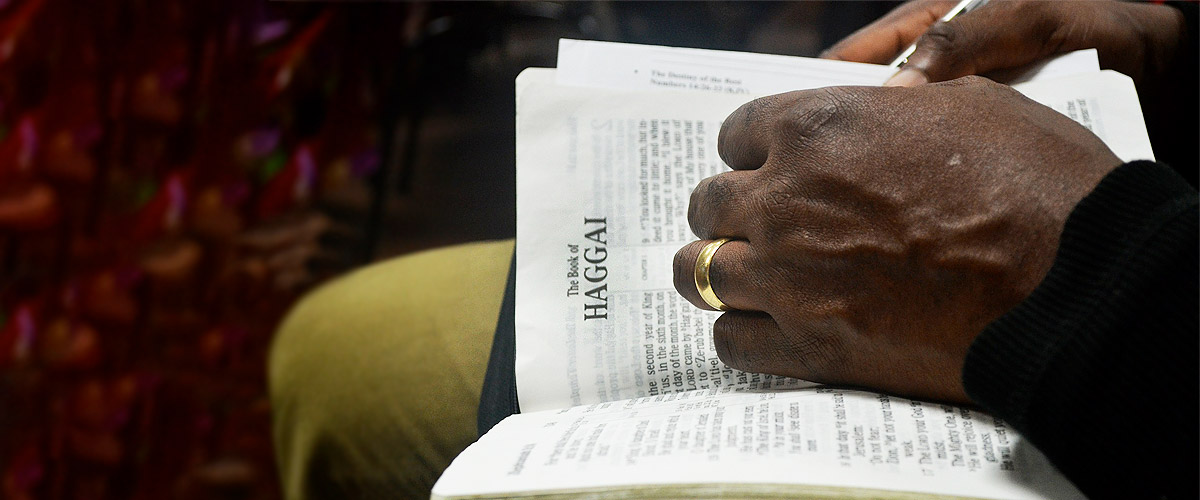Smith Wigglesworth studied plumbing and led thousands to Jesus. Charles Darwin earned his bachelor’s in Theology from Cambridge University and led millions away from Jesus. Not everyone’s experience of theology is so polarising, but if the Bible says, ‘Study to shew thyself approved’ (2 Timothy 2:15 KJV), why do some who attend seminary seem to so easily part ways with the truth?
Psalm 1 describes a man ‘like a tree planted by streams of water that yields its fruit in its season, and its leaf does not wither. In all that he does, he prospers’ (Psalm 1:3). This is a man whose delight is in the Word of God. He studies the law of God, we are told, and meditates on it day and night. This is clearly a resounding endorsement for studying the Scriptures. It would be easy to assume his devotion to theological study alone is what produces such wonderful fruit in his life. However, his time in the Word is only part of the picture. His study of Scripture is not applauded in isolation.
Scoffers, Sinners and the Counsel of the Wicked
In verse one we read that he ‘walks not in the counsel of the wicked, nor stands in the way of sinners, nor sits in the seat of scoffers’ (Psalm 1:1). Clearly the company he keeps has a lot to do with the way the Word impacts his life. The big question for anyone wanting to study the Word of God today is, ‘Can I do it in a way that avoids the wicked, sinners and scoffers?’
Recently, a young theology student wrote to me asking how to respond to their university Missiology lecturer who believes that Christianity is not the only true religion. Their lecturer believes that Christians have part of the truth, while other religions also contain truth about God and so we cannot claim Absolute Truth. ‘I am taught’, he wrote, ‘that to claim “superiority” of the Christian religion above others is comparable to claiming one race superior to another.’ This is simply false. Racism begins when people reject the truth that ‘from one man [God] created every nation’ (Acts 17:26). The exclusivity of the gospel stems not from rejection of truth, but rather fidelity to it. Unlike racism, the exclusivity of the gospel excludes nobody. It only excludes false ‘truths’. True, we can only come to God through Jesus, but it is also true that God desires all people to do just that (1 Timothy 2:4).
You can go to seminary with the best of intentions, but if your lecturers are scoffers, sinners or wicked of heart, you will likely become as they are.
Missiology is ‘the theological study of the mission of the church, especially the character and purpose of missionary work’ (Dictionary.com). How can someone teach on the mission of the Church while denying that Jesus is the only way to the Father? This is just one of many examples of how relativism and syncretism have infected the theology being taught. This respectable university’s website may speak about Jesus’ work of salvation and the ‘life-giving work of the Spirit’, but clearly these are not beliefs held by all in the faculty.
Bible College Today
It seems the tide is changing very fast. Some theology departments are becoming ‘religion’ departments instead, losing their emphasis on Christianity. Others are becoming secular or liberal, embracing everything that goes with that. Even established, traditional seminaries are often linked to denominations that would have a very different stance on evangelism, the apostolic, and the way to build church, compared to what is taught in the New Testament. The Bible warns that bad company corrupts good character (1 Corinthians 15:33 NIV). You can go to Bible college with the best of intentions, but if your lecturers are scoffers, sinners or wicked of heart, you will likely become as they are.
Partisan Theology
Another symptom of seminary is partisan theology. Indoctrination rather than revelation leads many students to hold firmly onto doctrines they don’t understand and couldn’t defend from Scripture. A common example is how Bible students love the Calvinism-Arminianism debate (if you are not familiar with this, it revolves around free will, election and whether you can lose your salvation). For hundreds of years, the debate has raged on. And, like football fans donning club jerseys not so as to play but to cheer from the stands, some theology students have so much of their personal identity connected to two 16th Century theologians that things become quite heated.
As students and teachers, we should never elevate the man or the doctrine above the gospel they were created to serve.
Paul said such identity-based mob behaviour, where membership is more important than truth, was evidence that we are not spiritual people but people of the flesh (1 Corinthians 3:1-9). It is our flesh that seeks identity in another man. Like Israel saying ‘give us a king’, it is God that we reject when we place our identity in any message or man besides Jesus (1 Samuel 8:7). Paul recognised his role in the work of the gospel, but always pointed people back to Christ. As students and teachers, we should never elevate the man or the doctrine above the gospel they were created to serve.
Finding Jesus
Another question to ask, besides how to study, is why do I want to study? Jesus said to the Pharisees, ‘You search the Scriptures because you think that in them you have eternal life; and it is they that bear witness about me, yet you refuse to come to me that you may have life’ (John 5:39,40). The Pharisees, the theology teachers of Jesus’ day, spent years in the Word but did not recognise Him. Two disciples spent an afternoon with Jesus in the Word and they recognised him by supper time (Luke 24:13-35).
There is no prize for what we know, only for what we do with what we know.
It is a wonderful thing to study the Word! It is excellent to draw on the wisdom of apostles and teachers who have gone before us and know more than us. But study is not an end in itself. The Word exists to lead us to Jesus. Ask yourself why you want to study and it’s possible that will alter the way you study. The best reason to study the Word is to know and serve Jesus better. There is no prize for what we know, only for what we do with what we know. Let us never be like those scribes and Pharisees who, devoted as they were to theology, missed the Man at the centre of the gospel.
Seminary Alternatives
When choosing where to study theology, be careful to investigate what you will be taught. Does the university or seminary have a statement of faith? Are their sponsored by a particular denomination? If you are looking for an academic qualification, you may find a distance learning option (like SATS in South Africa) is the best option. The reason distance learning may be best is that it allows you to remain in your current, New Testament-modelled church where you can continue to serve Jesus and actively apply all that you learn.
It may be that you are looking to take a year to deepen your relationship with God and to serve His church. Then seminary is not for you anyway. Consider rather JoshGen’s TMT, Oxygen Life’s Altitude, or Living Hope’s Year Of Your Life. These each offer different but equally wonderful experiences.
If you are looking to equip yourself informally at home, the Four12 website has many resources to help you grow. Many of these can be used in small groups, in pairs or alone. Get to know what is available and involve others.
Solomon, towards the end of his life, warned against the vanity of simply gaining knowledge.
Live What You’ve Learned
However you end up choosing to grow in God, stay connected with faith-filled saints who serve Jesus devotedly. Stay submitted to your local elders and partnering apostles, keeping a sober judgement of yourself, in spite of all you learn, to avoid intellectual pride. Devote yourself to spending time with Jesus – not just in His Word, but in worship and prayer and intimacy. Live out your faith by practically serving in your local church.
Solomon, towards the end of his life, warned against the vanity of simply gaining knowledge. His advice, given millennia ago, is still as relevant today. ‘Of making many books there is no end, and much study is a weariness of the flesh. The end of the matter; all has been heard. Fear God and keep his commandments, for this is the whole duty of man.’ (Ecclesiastes 12:12,13)












